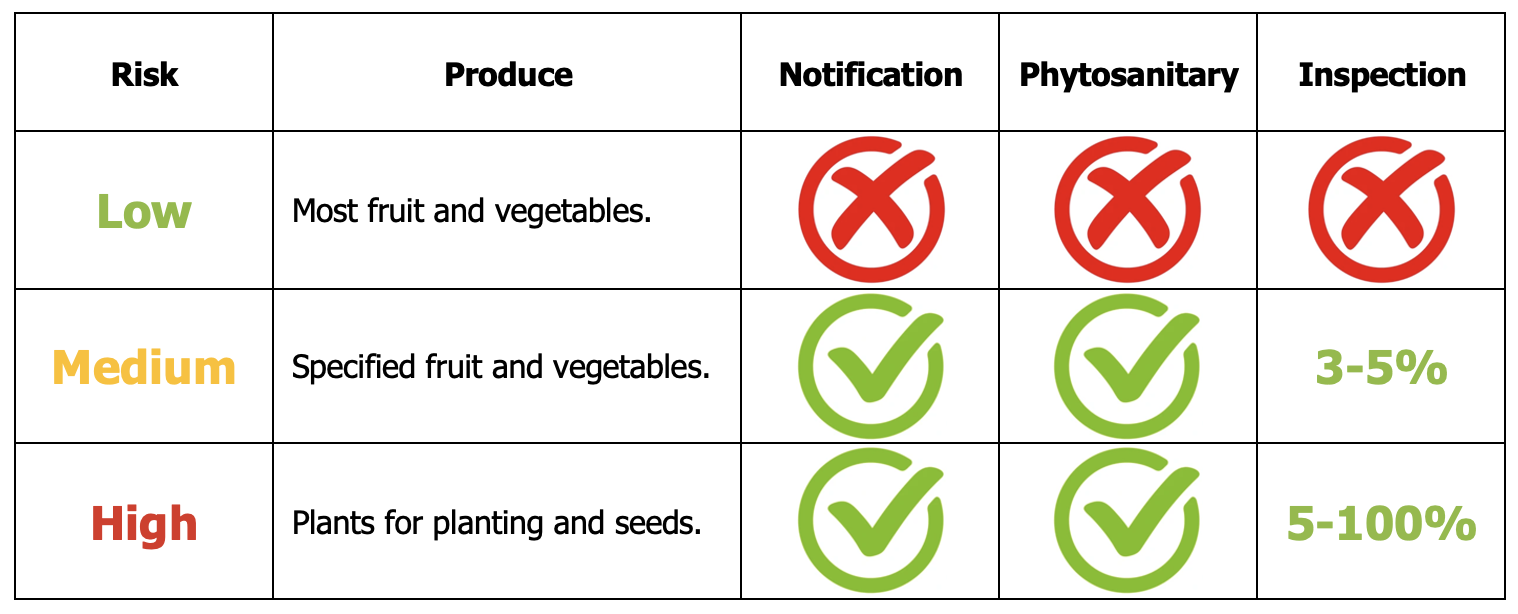
Food Imports
Health, phytosanitary and conformity certificates
Some fruit, vegetables and products of animal origin imported to the UK need to go through health controls, which are managed by:
APHA (Animal and Plant Health Agency) in England and Wales.
SASA (Science and Advice for Scottish Agriculture) in Scotland.
DAERA (Department of Agriculture, Environment and Rural Affairs) in Northern Ireland.
Often, this requires the provision of a health or phytosanitary certificate.
All fruit and vegetables imported to the UK should meet relevant quality and labelling requirements. On occasions, the importer must provide a suitable conformity certificate.
Import of Products, Animals, Food and Feed System (IPAFFS)
Depending on import requirements, shipments may need to be declared in IPAFFS, which is managed by DEFRA (Department for Environment Food and Rural Affairs).
The IPAFFS reference is then recored in the import declaration. Any mismatch between the IPAFFS and the import will result in the vehicle being diverted to Border Force for control.
Procedure
EU Goods
Fruit and vegetables grown in the EU generally do not need to go through UK marketing standards controls or plant health controls, there are notable exceptions such as potatoes. Therefore, phytosanitary and conformity certificates are not usually required.
Marketing standard controls for fruit and vegetables imported from the EU are not expected to be introduced until February 2027.
Products of animal origin must be pre-notified via IPAFFS. Generally, there is a health certificate requirement. Exceptions apply to certain goods, e.g. those in sealed contained that are shelf stable at room temperature and composite products that contain both meat and plant material. In the later case, the plant content of any composite product must be reasonably significant, e.g. flavouring or colouring is unlikely to qualify.
Non-EU Goods
Imported fruit, vegetables and products of animal origin from a non-EU country that arrive via the EU are treated as an EU import if they have:
Entered into “free circulation” (customs cleared and any duty or VAT paid).
Passed EU health checks.
Imported fruit, vegetables and products of animal origin from non-EU countries that pass through the EU using transit are subject to full control. They must be accompanied by the required health, phytosanitary and conformity certificates.
Inspection Rates
Controls will be based on the risk allocated to the goods, i.e. low, medium and high.
For fruit and vegetables imported from the EU, the following applies:
In the case of products of animal origin imported from the EU, the following applies:
Non-EU Goods
Different levels of control will be exercised between EU and non-EU goods.
Imported fruit, vegetables and products of animal origin from a non-EU country that arrive via the EU will continue to be treated as an EU import if they have:
Entered into “free circulation” (customs cleared and any duty or VAT paid).
Passed EU health checks.
Imports of low-risk fruit and vegetables from non-EU countries do not need to go through plant health controls. They do not need a phytosanitary certificate or pre-notification.
Imports of medium-risk fruit and vegetables, all high-risk plants/products and all products of animal from non-EU countries need to go through health controls. They need a health or phytosanitary certificate and pre-notification in IPAFFS.
Key considerations
Shippers should consult the following webpage to determine if any of their goods will be controlled:
In the case of products of animal origin, the position is clear, pre-notification will be standard. More importantly, health certificates will be required for meat products and any raw milk-based products.
It follows that importers will need to know how the cheeses, yogurts, etc. that they ship are manufactured.
If health certificates for dairy products are not provided, written confirmation that heat treated milk had been used in manufacture must be.
Shippers should consult the following webpage to determine if any of their goods will be controlled:


